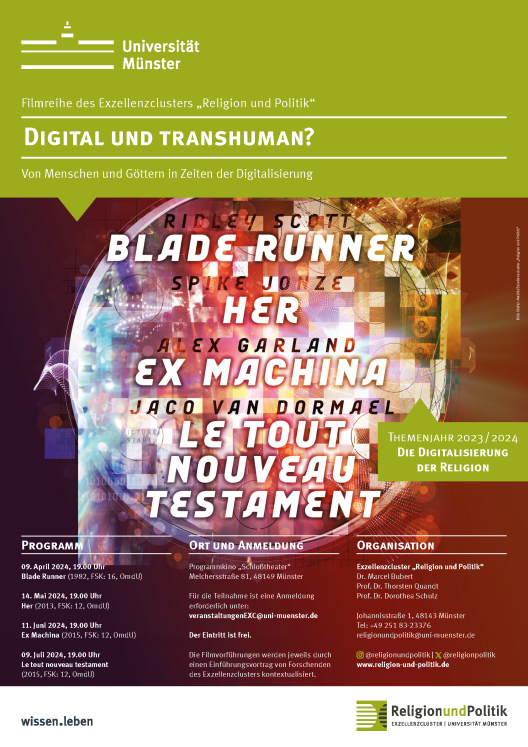Digital creatures, artificial intelligence and existential questions
Cluster of Excellence “Religion and Politics” film series “Digital and transhuman?” will show films about the relationship between humans and machines in the age of digitalization – Four films explore questions of being human – Start of the series at the Schloßtheater in Münster on 9 April – Researchers from the Cluster of Excellence introduce the films

Press release April 04, 2024
Digital creatures, artificial intelligence and existential questions: for the annual theme “The digitalization of religion”, the Cluster of Excellence “Religion and Politics” will show films in the film series “Digital and transhuman?” about the relationship between humans and machines in the age of digitalization. “Science fiction has always dealt with the relationship between humans and gods in a creative, challenging and sometimes disturbing way”, says communications expert Thorsten Quandt from the Cluster of Excellence. “Recent times in particular have seen the imagination of filmmakers being fired by advancing digitalization and developments in artificial intelligence. Their work also addresses ethical and religious questions, such as how humans deal with their artificial creations and the significance of the idea of ‘God’ in a world increasingly shaped by technology”.
The Cluster of Excellence’s four-part film series can be seen at the Schloßtheater in Münster from 9 April. Each film will be prefaced by a short introductory talk by a researcher from the Cluster, and there will be an opportunity for discussion in the Schloßtheater foyer after each film. All films will be shown in their original language with German subtitles. To participate, please register at: veranstaltungenEXC@uni-muenster.de. Admission is free.
About the films
The series begins on 9 April with Ridley Scott’s „Blade Runner”. This science-fiction classic from 1982 is set in a bleak future where people hope for a better life on distant planets. “To open up these alien worlds, they create artificial replicants. When these replicants return to Earth to answer questions about their own origins and existence, human beings are confronted with their creation and their own human nature”, explains historian Marcel Bubert, who will introduce the first evening of the film series. “The film raises numerous existential questions and encourages us particularly in the light of modern developments to reflect on artificial intelligence, the nature of humanity and the ethics of human-robot interaction”.
The second evening of the film series is dedicated to the film „Her”, which tells the story of the lonely writer Theodore, who falls in love with an artificial intelligence called Samantha. “This 2013 film is a moving reflection on loneliness, love and social bonds between people and the creatures that they create digitally”, says Thorsten Quandt, who will provide a short introduction to the film. “Samantha was created as an operating system for computers and gradually develops human-like abilities. The film uses the emotional bond that develops between Samantha and Theodore to explore the impact of technological developments on interpersonal relationships”.
In „Ex Machina”, young programmer Caleb is attracted to a female avatar named Ava, whose abilities he is tasked with testing. “The film explores the boundaries between human and machine in a world increasingly shaped by technology”, says Quandt, who will introduce the third film evening in the series on 11 June. “The dangerous web of manipulation and intrigue that entraps Caleb also raises questions about the consequences of technology running out-of-control and the ethics of human-robot interactions”.
The film series will conclude with the screening of the comedy „Le tout nouveau testament” on 9 July. The film is about a Christian God who lives as a cynical tyrant in Brussels and torments people on Earth. His daughter Ea rebels by hacking into his computer and sending everyone in the world the data on their death to their mobile phones. “Ea thus creates a world where people can make their own decisions and God becomes a better, less tyrannical being”, explains social and cultural anthropologist Dorothea Schulz, who will introduce the final evening of the film series. “The film addresses issues such as the fight against oppression and the search for identity, while also touching on the question of the role of ‘God’ in a digitalized world”. (fbu/pie/vvm)
Film series “Digital and transhuman? Of humans and gods in the age of digitalization”
9 April 2024, 7 pm – Blade Runner (1982)
14 May 2024, 7 pm – Her (2013)
11 June 2024, 7 pm – Ex Machina (2015)
9 July 2024, 7 pm – Le tout nouveau testament (2015)
Location: Schloßtheater, Melchersstraße 81, 48149 Münster
Registration at: veranstaltungenEXC@uni-muenster.de

